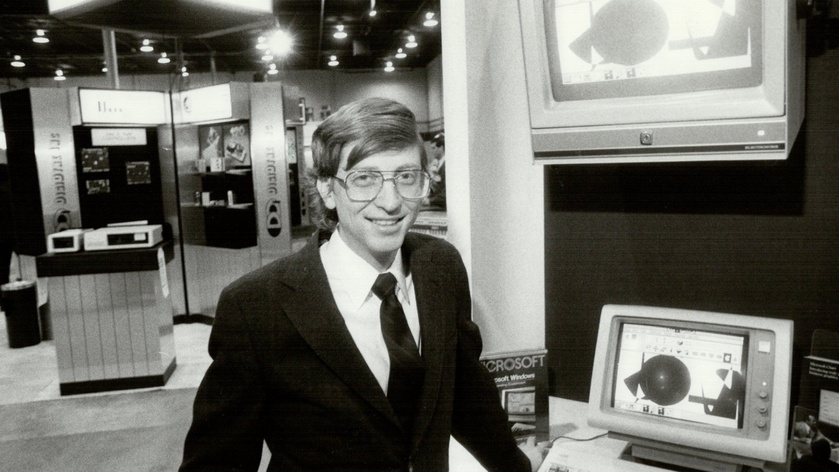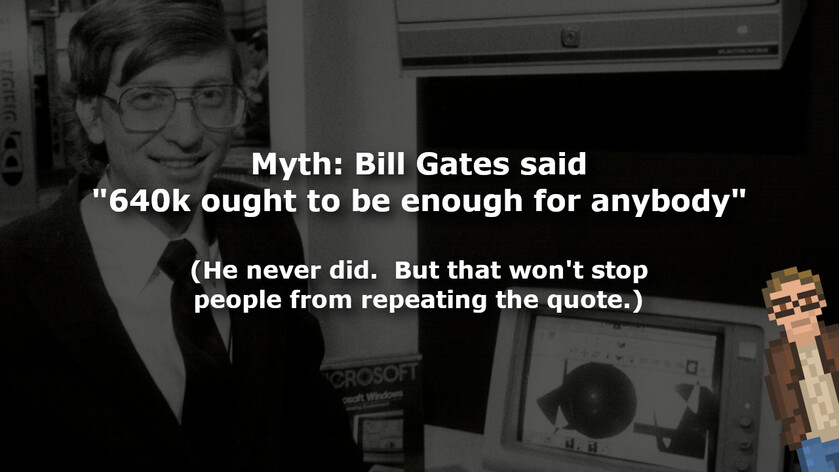The year is 1981. A young Bill Gates takes the stage at a computer conference.
In that speech, he utters one of the most famous quotes in all of computing:
"640K ought to be enough for anybody!"
There's a few teensy-tiny problems with that story:
- Nobody can remember what computer conference this might have been at.
- Nor if the year was even 1981.
- Not a single soul, on Earth, appears to have actually heard this quote first hand.
- Likewise, there are many disagreements on what the exact words were... it could have been "640K is more memory than anyone will ever need" or something like that.
There's also the inconvenient fact that Bill Gates, himself, denies ever having said it. Here is one such denial, from a 1996 piece on "Career Opportunities in Computing":
"I've said some stupid things and some wrong things, but not that. No one involved in computers would ever say that a certain amount of memory is enough for all time.
The need for memory increases as computers get more potent and software gets more powerful. In fact, every couple of years the amount of memory address space needed to run whatever software is mainstream at the time just about doubles. This is well-known.
When IBM introduced its PC in 1981, many people attacked Microsoft for its role. These critics said that 8-bit computers, which had 64K of address space, would last forever. They said we were wastefully throwing out great 8-bit programming by moving the world toward 16-bit computers.
We at Microsoft disagreed. We knew that even 16-bit computers, which had 640K of available address space, would be adequate for only four or five years. (The IBM PC had 1 megabyte of logical address space. But 384K of this was assigned to special purposes, leaving 640K of memory available. That's where the now-infamous "640K barrier" came from.)
A few years later, Microsoft was a big fan of Intel's 386 microprocessor chip, which gave computers a 32-bit address space.
Modern operating systems can now take advantage of that seemingly vast potential memory. But even 32 bits of address space won't prove adequate as time goes on.
Meanwhile, I keep bumping into that silly quotation attributed to me that says 640K of memory is enough. There's never a citation; the quotation just floats like a rumor, repeated again and again."
So, did Bill Gates actually make that famous "640k" quote?
Pretty darned unlikely.
No witness. Conflicting details. Full denial from Gates.
In fact, I'd say this is one of the easiest myths to debunk in all of computer history -- with similar debunkings done by several publications over the last few decades. But that won't stop people from repeating the quote.
Every day.
Until the end of time.
As a wise man once said, "A lie can travel halfway around the world while The Lunduke Journal is still putting on its shoes."

A Parting Thought...
Bill Gates has said and done many, many things that are worth mockery. Real things. Not made up things.
My favorite: In 2015, he tried to convince the world to drink poop water.
You're welcome.
The Lunduke Journal had debunked many common myths in computer history. Here's a few others that people (including many Tech Journalists) get wrong far too often.
- The first computer bug was a real moth.
- Ada Lovelace was the first computer programmer.
- The C++ mascot is not a diseased rat named Keith.
- The Palm Pilot / Apple Newton was the first PDA.
- Windows 3.1 did not have real multitasking.
- The legendary 8008 CPU was designed by Intel.
- Blackberry / iPhone was the first smartphone.















